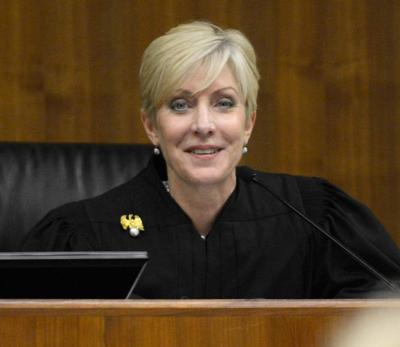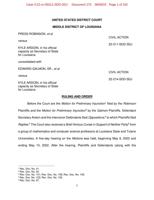A federal judge has ordered Louisiana’s Republican-dominated Legislature, which overpowered the state’s Democratic governor to enact a congressional map favorable to the GOP, to redraw the map to add a second majority-Black district.
The ruling by Chief Judge Shelly Dick, of the U.S. Middle District of Louisiana in Baton Rouge, blocks Secretary of State Kyle Ardoin – the defendant in the case – from holding congressional elections under the new map drawn by the GOP lawmakers earlier this year.
The ruling delivered a victory to the governor, voting rights groups and Democrats who fought to get another majority-Black district, which would be drawn to connect parts of Baton Rouge to Mississippi Delta parishes in north Louisiana.
But the win could be short-lived. Republican legislative leaders expressed confidence the 5th U.S. Circuit Court of Appeals, which is stacked with conservative judges, will swiftly move to block the ruling by Dick, an appointee of President Barack Obama. Ardoin, along with Republican legislative leaders and Attorney General Jeff Landry, both of whom intervened in the case, had already appealed the case by the close of business Monday.
Gov. John Bel Edwards said at a press conference Monday evening that he would swiftly call a special legislative session for legislators to come back to Baton Rouge to “do what is required by Section 2 of the Voting Rights Act – it’s required by basic fairness and math – that’s to come in and redo the districts.”
Ardoin’s office and Senate President Page Cortez both declined to comment on the ruling. Landry tweeted, “We believe she erred in her decision and have filed a notice of appeal. We look forward to the 5th Circuit halting the ruling!”
Chief U.S. District Judge Shelly Dick ruling on congressional redistricting
Dick told legislators to draw a map compliant with Section 2 of the federal Voting Rights Act by June 20. She wrote that the court would step in if the Legislature failed to draw a new map that complies with federal law.
Louisiana has unusually late congressional elections: Its midterm elections for Congress are scheduled for November, with potential runoffs in December. Dick’s ruling noted legislators could redraw the map in mid-June and still have roughly five weeks to notify voters before qualifying for midterms in late July, echoing arguments made by the plaintiffs. Qualifying for congressional elections is July 20-21.
Voting-rights advocates had challenged the GOP-drawn maps, which favored White candidates in five of six congressional districts, maintaining a status quo where U.S. Rep. Troy Carter, D-New Orleans, is the only Democrat and only Black congressman. Edwards, a Democrat, vetoed the maps, arguing they are not representative of a state in which nearly one in three people is African American and where Black population rose faster than White population over the last decade. Edwards argued that two of the state’s six members to the U.S. House should come from districts in which Black candidates had a strong chance of winning.
One of the plaintiffs, Edgar Cage, a New Orleans voter and organizer with the advocacy group Together Louisiana, said: “I’m not surprised because the Census speaks for itself, and the reason for the Census is to reflect populations and give groups a chance to elect a candidate of their choice.”
“The court proceedings aren’t over,” said state Sen. Sharon Hewitt, the Slidell Republican who as chair of the Senate & Governmental Affairs Committee played a large role in how the new maps were drawn. “We’ll let the process continue to work. I assume her ruling will be appealed.”
Republican leaders in the state House also expected the 5th Circuit to quickly step in to stay the decision.
If the ruling is upheld, Republicans, who hold a near-supermajority in the Legislature, could potentially lose a seat in Congress to Democrats. Plaintiffs in the case are seeking another majority-Black district that would encompass parts of Baton Rouge and connect to Mississippi River Delta parishes in northeast Louisiana, an area currently represented by Republican U.S. Rep. Julia Letlow, of Start.
Rep. John Stefanski, R-Crowley, who led the map-making in the state House earlier this year, said Monday he wasn’t surprised by the ruling. But he expects a different result at the appellate level.
“I would think the 5th Circuit would expedite this and make a quick ruling seeing as we have qualifying in a month and a half,” Stefanski said.
The lawsuit argues that the new map passed by the Legislature continues Louisiana’s “long history of maximizing political power for White citizens by disenfranchising and discriminating against Black Louisianans.” It notes that while Black residents make up 31.2% of the state’s voting age population, Black voters control only around 17% of the state’s congressional districts. Meanwhile, White voters, who make up 58% of the population, form a majority in 83% – or five of six – districts.
Decades ago, the U.S. Supreme Court established a three-part test to determine whether a districting plan violates Section 2 of the federal Voting Rights Act. First, plaintiffs must prove that the minority population is “sufficiently large and geographically compact” to support a map with a second majority-minority district.
Next, they must prove that Black voters are “politically cohesive” and that White voters tend to vote as a bloc to defeat candidates preferred by Black voters. In essence, the courts are asking whether voting is racially polarized, or in simpler terms, whether Black and White voters in Louisiana consistently vote differently.
Rep. Sam Jenkins of Shreveport, who chairs the House Democratic Caucus, said: “I’m elated and relieved that the court saw evidence on the merits that suggests this state should draw a map that contains at least two Black congressional districts.”






